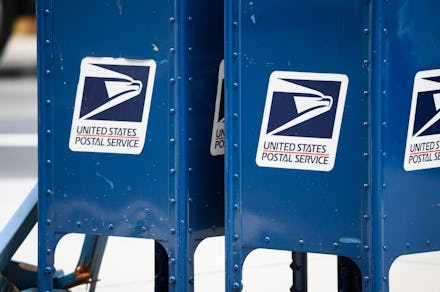The House passed $25 billion in USPS aid, but it's unlikely to go into effect

Thanks to consistent attacks from President Trump, the United States Postal Service has effectively been under siege. Over the weekend, the House passed a bill to save the USPS with $25 billion in emergency funding. While the bill easily made it through the Democrat-majority House, it may still be too early to celebrate as its fate in the Republican-controlled Senate remains more uncertain.
Last week, House Speaker Nancy Pelosi called on lawmakers to reconvene early following reports of lengthy mail delays, removals of mail-sorting machines, and more. On Saturday, the House voted on New York Rep. Carolyn Maloney's "Delivering for America Act." The bill prevents the USPS from implementing any changes to operations or services it had in place on Jan. 1, 2020. This also means halting the shutdown of mail-sorting machines and bringing back overtime.
In addition, the bill allocated $25 billion in funding to the USPS and classified election mail as "first-class," so mail-in ballots wouldn't face any delays. The bill passed with a vote of 257-150, with most of the bill's support coming from Democrats — although notably, 26 Republicans did vote in its favor. Before the vote, Politico reported that Pelosi told reporters, "We will pass the bill and it will be in a bipartisan way, and then we will send it to the Senate. They'll be hearing from their constituents because this hits home."
Amidst criticism and threats of lawsuits, the USPS previously backed away from some of its changes. Last Tuesday, Postmaster General Louis DeJoy — a top Republican Party donor who was appointed to the position by Trump in May — said in a statement that "to avoid even the appearance of any impact on election mail, I am suspending these initiatives until after the election is concluded."
But DeJoy's announcement didn't answer for any of the changes that have already occurred. In fact, Pelosi told reporters that in a meeting with DeJoy, he'd explicitly told her that he wouldn't reverse any of the changes — like, say, restore mailboxes that have been removed — but would merely suspend efforts to continue disrupting service.
Rather than welcoming the emergency funding under Maloney's bill, the USPS said in a statement, "We are concerned that some of the requirements of the bill, while well-meaning, will constrain the ability of the Postal Service to make operational changes that will improve efficiency, reduce costs, and ultimately improve service to the American people."
On Twitter, Trump referred to the bill as a "money-wasting hoax" and alleged that Democrats refuse to talk about "the universal mail-in ballot scam." As Trump continues with his disproven claims that mail-in voting will lead to fraud, it highlights how USPS is just one small part of a much larger problem.
The day after the House passed its legislation, Trump tweeted that "the greatest election fraud in our history is about to happen." And in the past, he's told supporters directly that, "The only way we're going to lose this election is if the election is rigged." Trump's attacks on the USPS are part of a larger tactic to delegitimize the election before it even happens — something he made pretty clear last week.
His strategy is so clear, in fact, that it was called out in a lawsuit filed federal court in Washington, D.C., by voters from four different states. Politico reported that in their complaint, the voters wrote that "DeJoy, doing Trump’s public bidding, has ensured even greater chaos in the fall elections, putting his thumb on the electoral scales to help ensure Trump's re-election and/or provide grounds for an election contest — not to mention helping Trump sow doubt in the minds of Americans about the integrity of the electoral process and the outcome itself, a loathsome tactic once associated only with tin-horn dictators and banana republics."
But even as voters hone in on the president's strategy, that doesn't mean lawmakers will necessarily intervene. Unlike the House, the GOP-controlled Senate hasn't cut its recess short and isn't set to formally reconvene until Sept. 8. And until the Senate returns, not much is going to the happen with the House's bill.
Even when senators do come back to work, it's unlikely that the bill will pass. Per Politico, Senate Majority Leader Mitch McConnell (R-Ky.) said the bill is "totally piecemeal" and dismissed concerns about the destruction of the Postal Service as "overblown conspiracy theories."